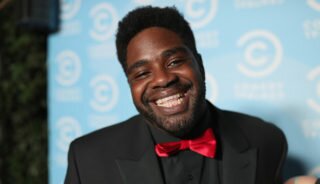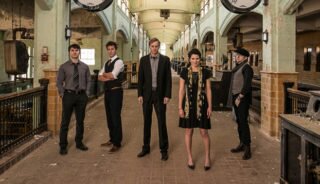
Guy Torry’s trip to Raleigh this week is more than just another stop on a stand-up comedy tour.
“I’ve been trying to get to this club for years, man,” Torry said of Goodnights Comedy Club during a Tuesday afternoon interview. “I’ve always heard good things about it from the comedian friends I have.”
Goodnights’ bona fides have been, and will continue to be, mentioned in this space, not just because it’s my go-to comedy spot or because I interview many of the comics, like Torry, who headline there. The club doesn’t need me to tell people how great it is, but sometimes I like to do that anyway just in case a person is reading one of my interviews for the first time. Raleigh residents, and really people all across North Carolina, have a place that is a destination for some of the best comics in the world right there in the capital city. My hope is that none of us — from first-time comedy show ticket buyers to people like me who have been to Goodnights a hundred times — take this gem of a club for granted.
Torry certainly doesn’t. Instead of enjoying a previously scheduled weekend off, and giving up tickets to a Seattle Seahawks-Los Angeles Rams football game, Torry, who grew up in St. Louis, jumped at the chance to play Goodnights, where he will be doing shows Thursday through Sunday. In addition to discussing how excited he is about coming to Raleigh, Torry and I talked about his funny and inspirational portrayal of Lamont in “American History X,” the rich legacy of Torry’s Phat Tuesdays comedy show, his beloved Rams leaving St. Louis for L.A., his ongoing charity work and much more.
Enjoy the interview, visit Torry’s website , follow him and don’t forget The Best Tweet I Can Find in Five Minutes at the end.
Tony Castleberry: You were outstanding in “American History X.” Did you feel like you and Ed Norton had good chemistry right away?
Guy Torry: It’s such an interesting story about “American History X” because I didn’t really traditionally audition for the movie. I got booked because the director and the producers saw my stand-up. They came to a comedy night that I created and was hosting at the time. I had another comedian/actor on the show they came down to see. (The actor) was one my mentors to be quite honest. They ended up giving me the role over him.
At the time I did “American History X,” I didn’t know who Ed Norton was because I hadn’t seen “Primal Fear.” It was the only project he had really done before “American History X.” When I got on the set, I quickly found out what a phenomenal actor he was. I was just like, “Hey, I’ve gotta hold my own. This guy is top notch.” So the chemistry actually wasn’t there in the beginning because I didn’t know who he was. There were issues on the set with him and the director and stuff like that so…I was in the middle of that tension. The scenes we had together where we weren’t bonding, (the tension) was perfect for that. As the movie progressed, and we got more and more friendly…I’m a guy that gets along with everybody. It was kind of natural, and as we got to know each other as the shoot went on, it was natural chemistry. What worked in real life worked on film.
TC: I had a follow-up question planned about that tension because I thought it came through early in the jail scenes, like, “Hey, these two might really not like each other.” That’s good for acting though, right?
GY: If you were training an actor — and I wasn’t training at the time, I am now — but if you can pick up on that and channel that energy, then it absolutely helps.
The director and Ed had a different opinion about how scenes should go or how his character should go so there were long discussions on set about the character, which frustrated the hell out of me. [interviewer laughs] I got caught in the middle because you listen to a director and not an actor telling you what to do and that was kind of the case. Ed, I applaud him because he cares about the entire film, not just his role. There are different ways to channel that, but that tension grew into production on set and it seeped into the script. The camera doesn’t lie. The strengths that I have came through, you know? I’m a guy in jail. It worked for the part. You’ve got to be able to recognize that and not let it hold you back and use it. That’s one of the things I’ve learned. I’ve been fortunate enough to work with some amazing actors and just be a sponge and sit back and learn and (Norton) was one of the first that I really sat back and studied. I picked up so many things from Ed Norton.
TC: You probably haven’t folded laundry a day since that movie, have you?1
GY: Oh, absolutely I have, man! I’m an Army brat. My dad was a drill sergeant, two tours in Vietnam so we were disciplined heavily growing up. He had the white glove and would come around and check for dust on Saturdays when we had to do our chores. We had to fold those sheets when mom did laundry. We had to make our beds and if the quarter didn’t bounce (off the sheets) when he came by for inspection, we had to remake our beds. Laundry (in the movie) came natural. That underwear was something totally different. That part I was unfamiliar with. I normally don’t sniff underwear. [interviewer laughs]
TC: Are you upset about St. Louis losing the Rams or excited that they’re in L.A. now?
GT: It’s bittersweet. I grew up in St. Louis and I’m a St. Louis Rams fan, not an L.A. Rams fan. … But now I live in L.A. I’ve been living here for 24 years now so it’s bittersweet for me.
All my friends in St. Louis who jumped off the Rams bandwagon are mad at me because I’m still a fan, but I’m like, “Wait a minute. They moved to the city I live in!” Their stadium is 10 minutes down the street from me. Why would I stop rooting for them now?
TC: Exactly! It’s not like you just moved to L.A.
GY: One of my friends that I went to high school with who lives out here in L.A. now — he works at ESPN — he jumped off the bandwagon and he wants to find a new team and I’m like, “Why, bruh? The girl came back, man, to L.A. She was in Cleveland but she wasn’t winning in Cleveland so she came to L.A. Then she went to St. Louis and now she’s back with one of her dudes. What are you mad about?”
TC: [laughs] That’s a great analogy.
GY: The thing about it is, if you look at it business-wise, come on. It’s a good business decision. The second they said they were moving to L.A. the team doubled in value. What businessman is not going to take that option?
TC: Where does Phat Tuesdays rank on your list of comedy achievements? I remember hearing and reading about that show, and I live in North Carolina.
GT: Really? Wow. Well, in my book, Phat Tuesdays is No. 1 of all the accomplishments I think I have. It not only benefitted me. It benefitted so many other comedians, and not just comedians in L.A. It was kind of the first successful urban room in a mainstream white club anywhere. Comics were coming from around the country to Phat Tuesdays because they had a chance to get discovered. In the audience on any given night, you’d have John Singleton, F. Gary Gray, Quentin Tarantino, Shaq, Denzel Washington, Prince, Charley Pride, Regina King. They were all in there because they wanted that brand of comedy.
After a few years (in Los Angeles), I just saw the lack of industry presence (at predominantly black clubs). I had a few credits under my belt by ‘95, a Def Comedy Jam credit and maybe one or two TV and movie credits. I went to The Comedy Store on Sunset and said, “Hey, can I do a night to showcase black talent? There is a lot of talent getting passed over because no one is coming to see them.” I already had an agent and a manager, but I had friends who weren’t getting a shot so I created this night in the Belly Room at The Comedy Store, which held maybe 90 people. We packed it every night, had to turn people away for nine months. I kind of outgrew it and we joke that the belly room kind of gave birth, skipped the 200-seat room and went to the 400-seater.
So many comedians who are box office draws today or are doing major tours today came to that room. From Katt Williams to Kevin Hart to Bill Bellamy to you name it. Richard Pryor used to come in and sit in the audience. I mean, you name it, they came through Phat Tuesdays. Cedric the Entertainer, when he first moved to L.A., the first room he played was Phat Tuesdays.
If you were black and didn’t have a TV show, it was hard to get to The Comedy Store unless it was on an open mic night. What Phat Tuesdays did was give these hungry comedians an A room to come work out in and get scouted in. Chris Tucker is another one I can name. (Movie executives) saw him in that room at Phat Tuesdays. They were scared to go to the hood to see black comics so they came to Phat Tuesdays. Nick Cannon, out of his own mouth, told me he got discovered at Phat Tuesdays. I remember him performing there because I booked him and he was underage. I didn’t know that would be the room where he was discovered.
I’m most proud of that because it wasn’t about me. It was about these young, hungry, black comedians having a platform to be showcased, to be seen and get discovered, and that’s what it should be about. That’s what I kind of wish comedy would go back to.
TC: That speaks to how unselfish you are and leads me into my last question. You’ve done a lot of charity work. Have you always felt compelled to help others or did that start happening after you achieved some success?
GT: My parents instilled that in us. … My mom raising us Catholic and us being altar boys and Boy Scouts growing up, that’s just ingrained in you. You’re taught to give. You’re taught to serve and I serve God by serving others.
It’s nothing that I pat myself on the back for because it’s something that we’re supposed to do. … It’s not something I go out and brag about, but I tell other people so they can get inspired and help somebody in their community too. Mainly now, I work with My Friends House Foundation here in L.A. Every Wednesday we go out and feed the homeless out of our own pockets. We give them prayer and we give them clothes. It’s just something that should be done because on those streets, there are a lot of broken dreams. Downtown L.A., on Skid Row, a lot of people who came out here to get into the entertainment industry fell on hard times. There are a lot of vets who served in Iraq, who served in Afghanistan, who served in Vietnam out on those streets. We’re supposed to do (help).
TC: I’m not on your level, but I find that when I help somebody out, as much it helps that person, it fills my spirit too, you know?
GY: We don’t need to compare what I do and what you’re doing or what other foundations are doing. The fact that you’re doing something is enough.
Here it is, The Best Tweet I Can Find in Five Minutes:
Body: Go to sleep.
Head: Time to rank all the stunts in the Fast & Furious movies from best to worst.— Kashana
- In the movie, after curb-stomping a black man to death, Norton’s white supremacist character is paired with Torry’s character to work in the jail laundry room. ↩








